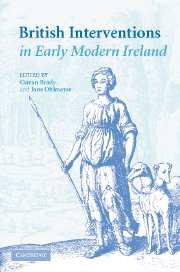Book contents
- Frontmatter
- Contents
- Notes on contributors
- Acknowledgements
- Aidan Clarke: an appreciation
- Conventions
- List of abbreviations
- 1 Making good: New perspectives on the English in early modern Ireland
- 2 The attainder of Shane O'Neill, Sir Henry Sidney and the problems of Tudor state-building in Ireland
- 3 Dynamics of regional development: processes of assimilation and division in the marchland of south-east Ulster in late medieval and early modern Ireland
- 4 The ‘common good’ and the university in an age of confessional conflict
- 5 The construction of argument: Henry Fitzsimon, John Rider and religious controversy in Dublin, 1599–1614
- 6 The Bible and the bawn: an Ulster planter inventorised
- 7 ‘That Bugbear Arminianism’: Archbishop Laud and Trinity College, Dublin
- 8 The Irish peers, political power and parliament, 1640–1641
- 9 The Irish elections of 1640–1641
- 10 Catholic Confederates and the constitutional relationship between Ireland and England, 1641–1649
- 11 Protestant churchmen and the Confederate Wars
- 12 The crisis of the Spanish and the Stuart monarchies in the mid-seventeenth century: local problems or global problems?
- 13 Settlement, transplantation and expulsion: a comparative study of the placement of peoples
- 14 Interests in Ireland: the ‘fanatic zeal and irregular ambition’ of Richard Lawrence
- 15 Temple's fate: reading The Irish Rebellion in late seventeenth-century Ireland
- 16 Conquest versus consent as the basis of the English title to Ireland in William Molyneux's Case of Ireland … Stated (1698)
- Principal publications of Aidan Clarke
- Index
1 - Making good: New perspectives on the English in early modern Ireland
Published online by Cambridge University Press: 31 July 2009
- Frontmatter
- Contents
- Notes on contributors
- Acknowledgements
- Aidan Clarke: an appreciation
- Conventions
- List of abbreviations
- 1 Making good: New perspectives on the English in early modern Ireland
- 2 The attainder of Shane O'Neill, Sir Henry Sidney and the problems of Tudor state-building in Ireland
- 3 Dynamics of regional development: processes of assimilation and division in the marchland of south-east Ulster in late medieval and early modern Ireland
- 4 The ‘common good’ and the university in an age of confessional conflict
- 5 The construction of argument: Henry Fitzsimon, John Rider and religious controversy in Dublin, 1599–1614
- 6 The Bible and the bawn: an Ulster planter inventorised
- 7 ‘That Bugbear Arminianism’: Archbishop Laud and Trinity College, Dublin
- 8 The Irish peers, political power and parliament, 1640–1641
- 9 The Irish elections of 1640–1641
- 10 Catholic Confederates and the constitutional relationship between Ireland and England, 1641–1649
- 11 Protestant churchmen and the Confederate Wars
- 12 The crisis of the Spanish and the Stuart monarchies in the mid-seventeenth century: local problems or global problems?
- 13 Settlement, transplantation and expulsion: a comparative study of the placement of peoples
- 14 Interests in Ireland: the ‘fanatic zeal and irregular ambition’ of Richard Lawrence
- 15 Temple's fate: reading The Irish Rebellion in late seventeenth-century Ireland
- 16 Conquest versus consent as the basis of the English title to Ireland in William Molyneux's Case of Ireland … Stated (1698)
- Principal publications of Aidan Clarke
- Index
Summary
Cromwell came over, and like a lightning passed through the land.
Bishop Nicholas French's dramatic, though retrospective, summary of the violent rupturing of Irish history which occurred in the middle years of the seventeenth century is so striking, so synoptic of the fundamental changes wrought during that epoch, that it has proved irresistible to writers seeking an appropriate expression to indicate a decisive terminal point signalling the end of one era and the beginning of another. Both as terminus ad quem and terminus a quo the years immediately surrounding Cromwell's campaign in Ireland have served historians remarkably well. They mark the final and well-nigh indisputable eclipse of the two great social and cultural groups whose complex interactions had determined the fundamental patterns of Irish history over the previous five centuries. As an internal political force in the land, the Gaelic Irish were now utterly destroyed, the few pockets of survival in Ulster, the midlands and in Munster which had been the loci of their final resistance now suppressed and their lands given over to English occupiers. The ‘Old English’ – as the descendants of the Anglo-Norman colonial community had for some time chosen to identify themselves – had likewise been brought low. The common fate of disempowerment, dispossession and dislocation which they were now to share with the native Irish served as an appropriate nemesis to the ambivalent and disingenuous relationship which they had deliberately maintained with their Gaelic neighbours over the previous centuries.
- Type
- Chapter
- Information
- British Interventions in Early Modern Ireland , pp. 1 - 27Publisher: Cambridge University PressPrint publication year: 2005

